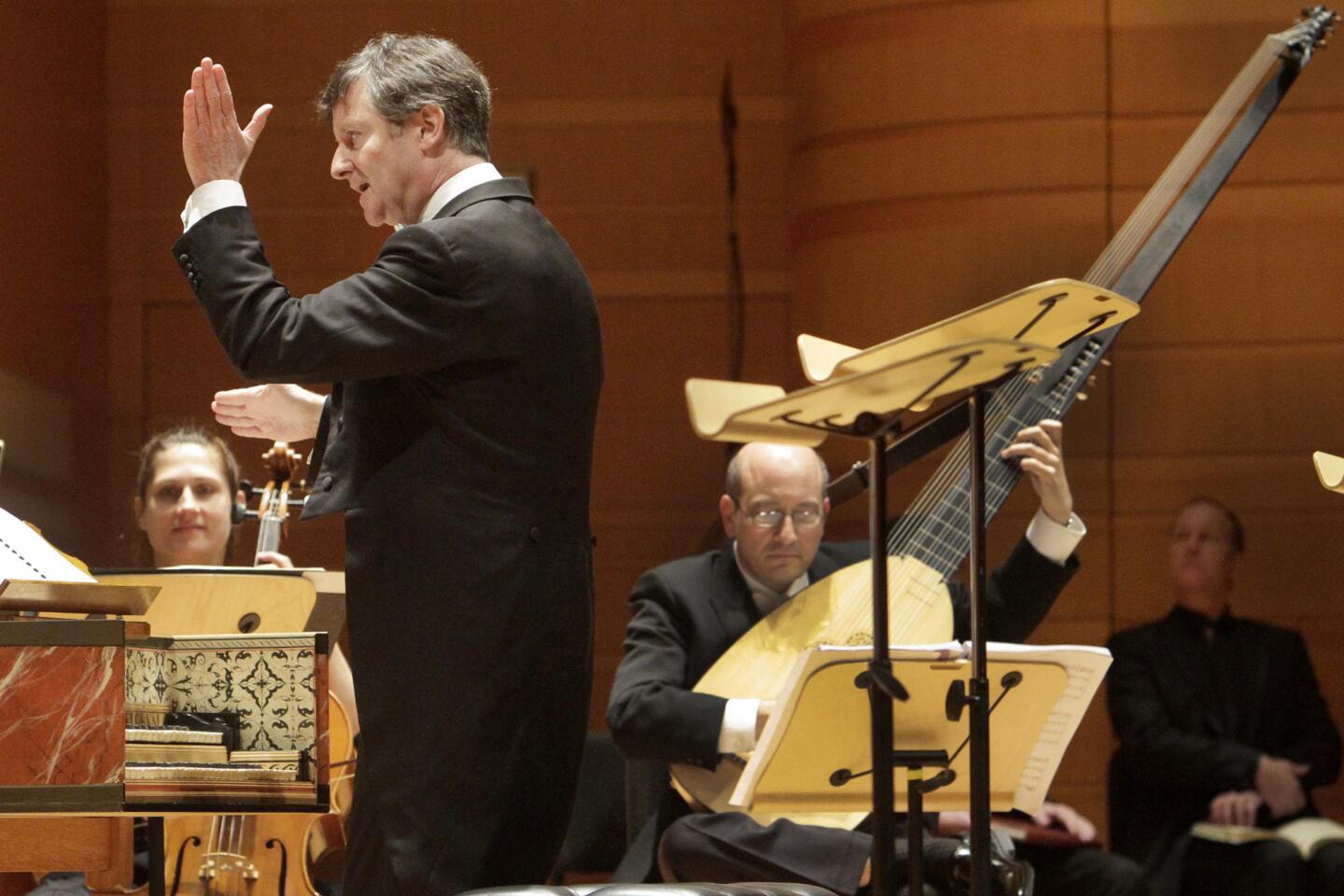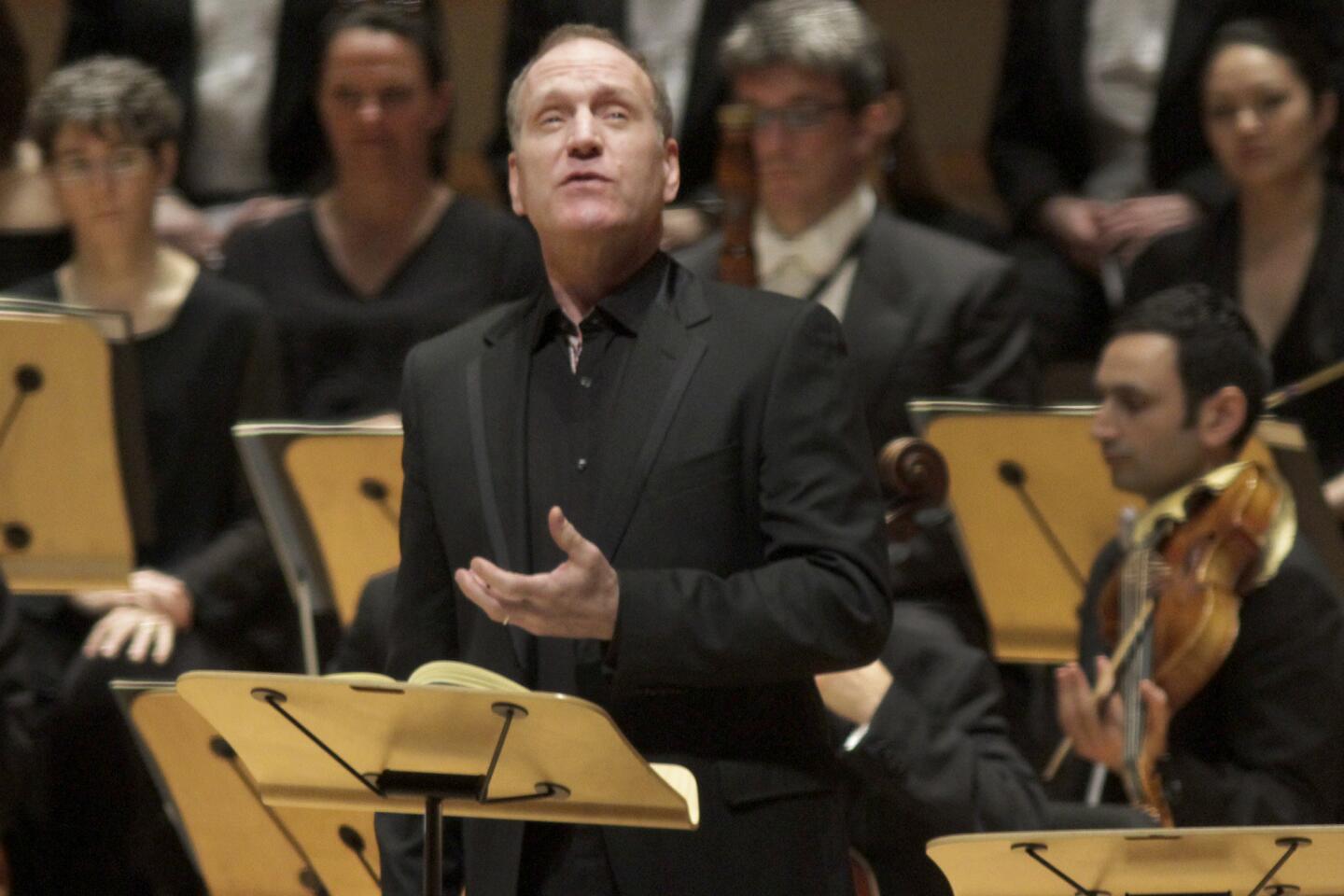Bach’s B-Minor Mass, Handel’s ‘Theodora’ and magnificent coincidence
Bach and Handel did not lead intersecting lives. Bach never left central Germany, while Handel became a cosmopolitan Londoner. Bach was a man of the church and had 20 children. Handel caught the theater bug and was not a family man (recent musicology presumes him to have been gay).
But what are the odds that these two pillars of the Baroque would be born less than a month apart in the winter of 1685 and 90 miles away? And in another magnificent coincidence, each produced his most compelling spiritual summing-up, a resplendent working through of crises of faith, in 1749. That was the year Bach put the final touches on his B-Minor Mass and Handel wrote one of his late oratorios, “Theodora.”
So it was still another remarkable coincidence that these 1749 masterpieces happened to independently reach Southern California in magnificent back-to-back performances. A centerpiece of the Los Angeles Master Chorale’s 50th anniversary season, the B-Minor Mass was given Saturday afternoon and Sunday evening at Walt Disney Concert Hall.
PHOTOS: Best classical concerts of 2013 | Mark Swed
“Theodora” is, in these parts, a rarity, but the English Concert happens to be celebrating its 40th anniversary with a touring “Theodora” (all four hours of it) featuring stellar singers, and the Philharmonic Society brought that to the Renée and Henry Segerstrom Concert Hall in Costa Mesa Monday night.
The scores are not, superficially, alike, and neither were the performance approaches. The English Concert is one of London’s best-known period-instrument groups and is led by an early music specialist, Harry Bicket. The Master Chorale, under its music director Grant Gershon, is the model modern chorus, comfortable in music of many centuries, attitudes and world cultures.
In a new Bach biography, “Music in the Castle of Heaven,” the conductor John Eliot Gardiner charts the B-Minor Mass as the composer’s personal journey. Gardiner describes the role of the performer as that of guide, discoverer of revelation. The mass becomes for an audience a collective spiritual experience, with the goal not so much of religiosity as the attainment of communal peace.
PHOTOS: Faces to watch 2014 | Classical music
That was Gershon’s approach. He sculpted choral surfaces and substances. The magisterial opening of the Kyrie became an exclamation of a monumental occurrence, the massed sound of a crowd as an earthquake suddenly begins cracking the ground. Journey’s end, “Dona nobis pacem” (Grant us peace) is one of the most inspired passages in all of Bach, makes peace seem, against all reason, possible. Gershon’s Master Chorale made Bach live.
Just the opposite of a big Mass, Handel’s oratorio is personal drama and tragedy. An early Christian martyr, Theodora resists governmental pressure to worship Roman gods, and she is doomed as is her lover, a converted Roman soldier, Didymus. They die together, unwavering in faith, as many do today in religious divides.
Peter Sellars directed a famed 1996 staging of “Theodora” at the Glyndebourne Festival in England, in which the countertenor David Daniels was Didymus, the performance that made him a star, and he was Didymus again Monday. Bicket was the young harpsichordist in the Glyndebourne production. Both now are among our most authoritative Handelians.
PHOTOS: The most fascinating arts stories of 2013
Handel thought “Theodora” contained his finest music. Though a study in constancy, his score ranges through human emotion. Handel’s peace is personal and inner, and the battles waged and won by Theodora and Didymus are great and unobvious ones.
But it is in the effect the lovers have on others — Romans and Christians and most of all Theodora’s confidant, Irene — that the oratorio rises to its extraordinary inspirational heights. In fact, Irene and the chorus get the most moving music.
The long performance was riveting in every way. Conducting from the harpsichord, Bicket was all business, shaping every phrase for its dramatic intent. Soprano Dorothea Röschmann was a zealously operatic Theodora and mezzo-soprano Sarah Connolly an ardently passionate Irene. Daniels approaches Didymus from the inside out, and the countertenor’s eloquent fervor is reaching new depths.
Tenor Kurt Streit (the Roman officer Septimius) and bass Neal Davies (the murderous president of Antioch, Valens) represented the power. The Choir of Trinity, Wall Street, sang the choruses with comforting exactitude. I wonder whether the English Concert has ever sounded better than it does now under Bicket.
The B-Minor Mass is beloved; “Theodora” still needs its advocates. Disney was full at the Saturday performance I heard. The slightly smaller Segerstrom was not as well attended Monday. But the world obviously needs more than ever the collective peace and inner strength, the yin and yang of Bach and Handel, to regain its balance. What are the odds?
More to Read
The biggest entertainment stories
Get our big stories about Hollywood, film, television, music, arts, culture and more right in your inbox as soon as they publish.
You may occasionally receive promotional content from the Los Angeles Times.
















